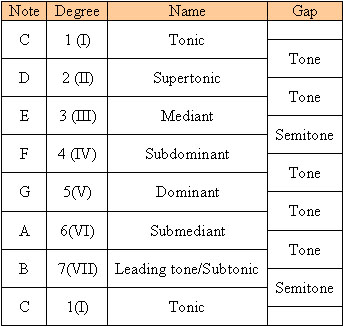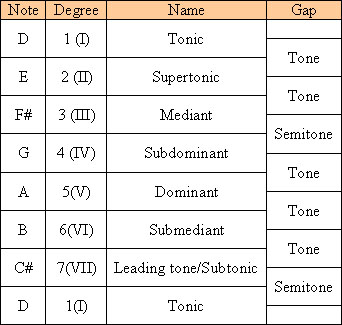Intervals Chords Triads & Harmonies, Part 1 - Degrees of the scale |
|
|
|
|
|
| Mar 10 2007, 11:48 PM |
|
Intervals Triads Chords & Harmonies - Part 1 Introduction Greetings all, and welcome to the latest GMC Theory Lesson! In this multi part lesson we are going to build on our knowledge of the major scale, and start looking at a couple of key concepts around chord and harmony construction. When we are done, you'll be able to understand complex relationships between notes, harmonize a lead line, construct a B augmented chord, and leap tall buildings in a single bound ... Degrees of the Scale All of the above starts simply with a concept that should already be familiar to you as the formula for a Major Scale. If you are not familiar with major scales, check out the major scale lesson here. Next, we are going to learn about degrees of the scale - this is a system for talking about notes in a scale without reference to the notes themselves, or what scale they are in. This is a little boring for now but will help us a lot later on. You should remember that starting at the root note of a scale, and applying the Whole/Half formula, we can generate the scale. For those of you that have forgotten, the formula is: W W H W W W H Technically, we should be calling the whole notes tones and the half notes semi-tones, so I am going to rewrite the formula with different letters, to remind you of this: T T S T T T S So far so good, but where is this leading? Well the formula above tells us about the gaps between different notes of the scale, but we need a way to refer to the notes themselves, and we do this by a system of numbers and names. We start with the root of the scale and give that the number 1, (sometimes roman numerals are used), and count up one for each note in the scale. Each of these numbers is a degree of the scale, each degree also has a name. For example, the scale of C has the notes C,D,E,F,G,A,B,C according to our formula. We would number them as in the table below. I am also showing you the formula steps, and the name of each degree.  Notice, that when we get back to C an octave higher, we call it the Tonic again, and call it the 1st degree, as in scale terms the two notes are equivalent. Also note that the 7th note can be called either the leading note or subtonic. What does this buy us? Well, lets look at the scale of D major in the same way:  As you might expect, although the notes are completely different, the names, degrees and Gap formula all remain exactly the same. So what we have here is a way of talking about the relationship between different notes in a scale regardless of the actual notes themselves. If we want to talk about the 3rd note of a scale, it performs the same musical function regardless of the key, and we now have a language to talk about it that is independent of the actual note or scale. In our examples above, E in the scale of C, and F# in the scale of D are both 3rd notes, and anything we want to say about 3rd notes relates to each equally. This will come in very handy later on. As a final note for this lesson, you will be pleased to know that the formal names (Dominant, Tonic etc) are rarely used. Most people refer to the numeric degrees of the scale, so if you can't remember the names don't worry! In the next lesson will see how we can use degrees of the scale to understand intervals, and from there we move on to chords and harmonies! Editorial note: published 24 Sept 2007 This post has been edited by Maria: Sep 26 2007, 08:40 PM -------------------- Check out my Instructor profile
Live long and prosper ... My Stuff: Electric Guitars : Ibanez Jem7v, Line6 Variax 700, Fender Plus Strat with 57/62 Pickups, Line6 Variax 705 Bass Acoustic Guitars : Taylor 816ce, Martin D-15, Line6 Variax Acoustic 300 Nylon Effects : Line6 Helix, Keeley Modded Boss DS1, Keeley Modded Boss BD2, Keeley 4 knob compressor, Keeley OxBlood Amps : Epiphone Valve Jnr & Head, Cockburn A.C.1, Cockburn A.C.2, Blackstar Club 50 Head & 4x12 Cab |
|
|
||
Posts in this topic
 Andrew Cockburn Intervals Chords Triads & Harmonies Mar 10 2007, 11:48 PM
Andrew Cockburn Intervals Chords Triads & Harmonies Mar 10 2007, 11:48 PM
 radarlove1984 Once again, great lesson.
Thanks for doing these... Mar 12 2007, 02:52 AM
radarlove1984 Once again, great lesson.
Thanks for doing these... Mar 12 2007, 02:52 AM

 Andrew Cockburn QUOTE (radarlove1984 @ Mar 11 2007, 09:52... Mar 12 2007, 03:15 AM
Andrew Cockburn QUOTE (radarlove1984 @ Mar 11 2007, 09:52... Mar 12 2007, 03:15 AM
nnn

 Kristofer Dahl This is excellent - just what RipDime asked for in... Mar 12 2007, 08:32 AM
Kristofer Dahl This is excellent - just what RipDime asked for in... Mar 12 2007, 08:32 AM
 BalysLTU Isn't the 7th degree called the subtonic? Apr 4 2007, 08:47 AM
BalysLTU Isn't the 7th degree called the subtonic? Apr 4 2007, 08:47 AM

 Andrew Cockburn QUOTE (BalysLTU @ Apr 4 2007, 03:47 AM) I... Apr 4 2007, 02:17 PM
Andrew Cockburn QUOTE (BalysLTU @ Apr 4 2007, 03:47 AM) I... Apr 4 2007, 02:17 PM
nnn

 mattacuk This is really useful to me and just what I wanted... May 10 2007, 09:49 AM
mattacuk This is really useful to me and just what I wanted... May 10 2007, 09:49 AM
 Rockwouldbe i can wait for your new lesson man. it is so immpo... May 10 2007, 03:05 PM
Rockwouldbe i can wait for your new lesson man. it is so immpo... May 10 2007, 03:05 PM

 Andrew Cockburn QUOTE (Rockwouldbe @ May 10 2007, 10:05 A... May 11 2007, 01:37 AM
Andrew Cockburn QUOTE (Rockwouldbe @ May 10 2007, 10:05 A... May 11 2007, 01:37 AM

 Bitey QUOTE (Andrew Cockburn @ May 10 2007, 07... May 15 2007, 04:59 PM
Bitey QUOTE (Andrew Cockburn @ May 10 2007, 07... May 15 2007, 04:59 PM

 Andrew Cockburn QUOTE (Bitey @ May 15 2007, 11:59 AM) So ... May 16 2007, 03:51 AM
Andrew Cockburn QUOTE (Bitey @ May 15 2007, 11:59 AM) So ... May 16 2007, 03:51 AM

 benhowell QUOTE (Andrew Cockburn @ May 16 2007, 03... May 16 2007, 07:54 PM
benhowell QUOTE (Andrew Cockburn @ May 16 2007, 03... May 16 2007, 07:54 PM

 Andrew Cockburn QUOTE (benhowell @ May 16 2007, 02:54 PM)... May 16 2007, 10:19 PM
Andrew Cockburn QUOTE (benhowell @ May 16 2007, 02:54 PM)... May 16 2007, 10:19 PM

 benhowell QUOTE (Andrew Cockburn @ May 16 2007, 10... May 16 2007, 10:58 PM
benhowell QUOTE (Andrew Cockburn @ May 16 2007, 10... May 16 2007, 10:58 PM
nnn
nnn
nnn
nnn
nnn
nnn

 FretDancer69 QUOTE (Andrew Cockburn @ May 15 2007, 08... Jan 12 2008, 10:16 PM
FretDancer69 QUOTE (Andrew Cockburn @ May 15 2007, 08... Jan 12 2008, 10:16 PM

 Andrew Cockburn QUOTE (FretDancer69 @ Jan 12 2008, 04:16 ... Jan 12 2008, 10:25 PM
Andrew Cockburn QUOTE (FretDancer69 @ Jan 12 2008, 04:16 ... Jan 12 2008, 10:25 PM

 FretDancer69 QUOTE (Andrew Cockburn @ Jan 12 2008, 03... Jan 12 2008, 10:30 PM
FretDancer69 QUOTE (Andrew Cockburn @ Jan 12 2008, 03... Jan 12 2008, 10:30 PM
nnn
nnn

 Pi38 Are you saying that if your playing in the key of ... May 28 2008, 03:50 PM
Pi38 Are you saying that if your playing in the key of ... May 28 2008, 03:50 PM

 Andrew Cockburn QUOTE (Pi38 @ May 28 2008, 10:50 AM) Are ... May 29 2008, 12:50 AM
Andrew Cockburn QUOTE (Pi38 @ May 28 2008, 10:50 AM) Are ... May 29 2008, 12:50 AM
nnn

 Xose Pineda like a lot the theory lessons... :S
Cheers! Jul 17 2008, 04:14 AM
Xose Pineda like a lot the theory lessons... :S
Cheers! Jul 17 2008, 04:14 AM
 Mrblomme Awesome lesson Andrew, love it a lot! Feb 18 2009, 09:18 PM
Mrblomme Awesome lesson Andrew, love it a lot! Feb 18 2009, 09:18 PM

 Andrew Cockburn Thanks! Feb 23 2009, 07:02 PM
Andrew Cockburn Thanks! Feb 23 2009, 07:02 PM
nnn

 Capt.Z These lessons are so helpful, I'm combining th... Feb 25 2009, 01:46 AM
Capt.Z These lessons are so helpful, I'm combining th... Feb 25 2009, 01:46 AM

 Andrew Cockburn Cool! Send me a copy and I'll sign it and ... Feb 25 2009, 02:39 PM
Andrew Cockburn Cool! Send me a copy and I'll sign it and ... Feb 25 2009, 02:39 PM

 Capt.Z QUOTE (Andrew Cockburn @ Feb 25 2009, 08... Feb 25 2009, 04:45 PM
Capt.Z QUOTE (Andrew Cockburn @ Feb 25 2009, 08... Feb 25 2009, 04:45 PM

 audiopaal QUOTE (Andrew Cockburn @ Feb 25 2009, 02... Feb 25 2009, 11:55 PM
audiopaal QUOTE (Andrew Cockburn @ Feb 25 2009, 02... Feb 25 2009, 11:55 PM
nnn
nnn

 derper Andrew (or anyone)....I'm kind of new here, bu... Dec 30 2011, 01:28 AM
derper Andrew (or anyone)....I'm kind of new here, bu... Dec 30 2011, 01:28 AM
nnn
nnn
1 User(s) are reading this topic (1 Guests and 0 Anonymous Users)
0 Members:

















